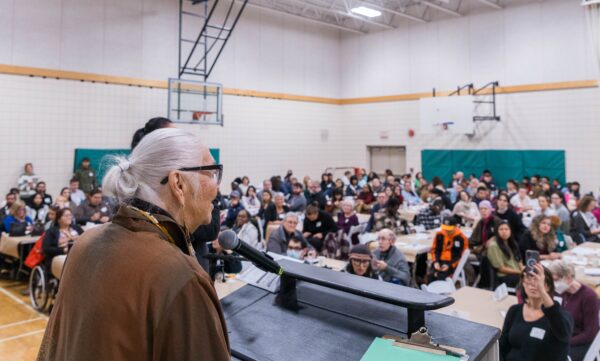The Manitoba government’s 2025 provincial budget outlines some continued commitment to building a more resilient and inclusive economy, with targeted investments aimed at strengthening local communities, supporting youth, and creating good jobs across the province. While the direction of the budget aligns with several of our long-standing priorities, members of the CED community in Manitoba are approaching this progress with cautious optimism—and a recognition that more work remains to fully address the needs of Manitobans.
Ahead of Budget 2025, CCEDNet Manitoba submitted a number of member-driven proposals focused on advancing local economic development, supporting equity-seeking groups, and strengthening social enterprise. While none were fully adopted, it is encouraging to see partial progress in areas like local procurement and employment training.
Read our full budget submission here.
Prioritizing Local Procurement
A key focus of this year’s budget is enhancing Manitoba’s economic self-reliance by prioritizing local and Canadian procurement. As part of this initiative, the government is reviewing contracts with U.S.-based businesses across all departments—while ensuring essential services remain uninterrupted. The aim is to better leverage provincial purchasing power to support local industry and job creation, a move framed as helping to “Trump-proof” the Manitoba economy amid ongoing international trade uncertainties.
To support this shift, a new procurement policy will be introduced once the review is complete. It will include clear guidelines, best practices, and a preferred vendor list that prioritizes Manitoba and Canadian businesses. Manitobans can also access the Buy Local website to find locally-sourced goods and services—empowering consumers to support the provincial economy directly.
This is a promising direction, but we’ll be watching closely to see how these procurement changes are implemented in practice. ‘Trump-proofing’ Manitoba’s economy would be made even stronger by prioritizing social enterprises, co-operatives, and community-based organizations in procurement policy. This would aim to create more resilience and local prosperity in government purchasing. CCEDNet Manitoba’s budget submission made some specific recommendations on policy levers to strengthen social, and not simply local, procurement here in Manitoba that should be adopted
Harnessing the Power of the Social Economy
In line with its social and economic priorities, Budget 2025 allocates new funding for employment and training programs through Manitoba-based social enterprises. These initiatives aim to provide low-income and marginalized individuals with the skills and qualifications needed to access meaningful employment opportunities. While the scale of the investment is modest, the government’s recognition of the role social enterprises play in inclusive economic development is an encouraging step. Further investing in the social economy through a Social Enterprise Manitoba strategy, co-operative development supports, and social finance tools would contribute to a more resilient provincial economy and more inclusive communities.
The province is also building on its community development efforts through the From the Ground Up grant program. Following last year’s $12.5 million investment in youth sports, food programs, after-school supports, and job training, an additional $1 million will be provided this year to sustain grassroots initiatives—a modest but welcome continuation.
Looking Ahead
While Budget 2025 marks progress in areas CCEDNet Manitoba and our members have long advocated for, it also highlights the need for deeper and more sustained investments. Manitoba’s economic future depends on inclusive, community-driven solutions that reflect the lived realities of people across the province.
CCEDNet Manitoba and our members will continue engaging with government and community partners to ensure these ideas move forward—and that every Manitoban has the opportunity to thrive.
Coalition Responses
As we reflect on the 2025 provincial budget, it’s important to highlight the voices of advocacy groups working toward a more equitable Manitoba. While the budget includes some encouraging steps, community coalitions supported by CCEDNet Manitoba are pointing out where deeper investments and more urgent action are still needed.
Make Poverty History Manitoba
In their op-ed response, Make Poverty History Manitoba emphasized the need for bolder, more comprehensive action to reduce poverty across the province. In response to Budget 2025, Make Poverty History Manitoba also shared their perspective in an op-ed for the Winnipeg Press.
Right to Housing Coalition
The Right to Housing Coalition also weighed in, expressing concern over the limited investment in affordable housing. Their response calls for a stronger provincial commitment to addressing Manitoba’s housing crisis and ensuring everyone has access to safe, stable housing. The Right to Housing coalition also shed light on the 2025 Budget. Click here to read.
Climate Action Team
The Climate Action Team calls for the government to fast-track investments in its Affordable Energy Plan, growing low-carbon infrastructure investment opportunities in housing and public buildings. Read more here.
Canadian Centre for Policy Alternatives – Manitoba
Read CCPA Manitoba’s analysis on public services, revenues and taxes, stimulus spending, and more here.
More responses and analysis? Something missing here?
Let Mia Bastien, CCEDNet Manitoba’s Policy & Advocacy Coordinator know and it can be shared in future newsletters.










